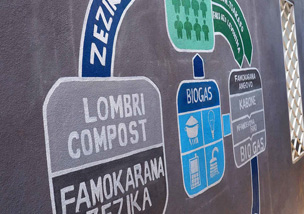 Last year I wrote about the importance of reinventing the toilet for the 21st century – the need for waste systems that recognise waste as a resource, that capture and recycle nutrients and don’t contaminate clean water. This weekend my mum, who is a dedicated Madagascar-watcher, introduced me to a great example of just such a thing: Loowatt.
Last year I wrote about the importance of reinventing the toilet for the 21st century – the need for waste systems that recognise waste as a resource, that capture and recycle nutrients and don’t contaminate clean water. This weekend my mum, who is a dedicated Madagascar-watcher, introduced me to a great example of just such a thing: Loowatt.
Loowatt is an innovative toilet system that makes human waste into a business opportunity by turning it into biogas and compost. Rather than flushing waste away, it is safely and hygienically sealed in a biodegradeable film and stored in a cartridge. These are then emptied into a digester that harvests the gas. At the end of the microbial process, the digestate is delivered to a compost factory where it is mixed with straw and processed by wormery into vermicompost.
The system was tested in the UK with houseboat owners, and is now being piloted in Madagascar. The pilot is based at a public toilet facility in Antananarivo, and the gas is used to heat water for local residents and generate electricity for charging mobile phones. One day’s biogas is enough to deliver 20 hot showers or 1,000 phone charges.
The Loowatt model is a good one for several reasons. It answers an urgent need for safe toilet facilities. (I knew that part of town in the 90s. It was filthy then and it doesn’t look like it’s improved much in the meantime.) It transforms what was a public health liability into clean energy and agricultural inputs. It’s waterless. It is a business in its own right, and therefore economically sustainable and not dependent on charity. And in true appropriate technology style, it uses off the shelf parts and local materials.
As an added bonus, their videos are refreshingly positive and authentically Malagasy, telling the story through the words of local people in a way that would please the team behind the Rusty Radiator Awards. Here’s one of them:
Of course, this sort of intelligent waste system shouldn’t be seen as a developing world solution. The flushing toilet is almost universal, but that doesn’t mean it’s the final word in toilet technology. As just one example, in my part of Luton there’s an old public toilets up for sale because the council can’t afford to keep it open in these times of austerity. If we were able to see and exploit the potential value of human waste, that facility would not just be open, but profitable.

Sounds really interesting, I hope they make it work. Thanks for sharing.
Reblogged this on ravinalablogs and commented:
What do people worry about in Madagascar?
Waste is wasteful if not used as a raw material for another product in the cycle.